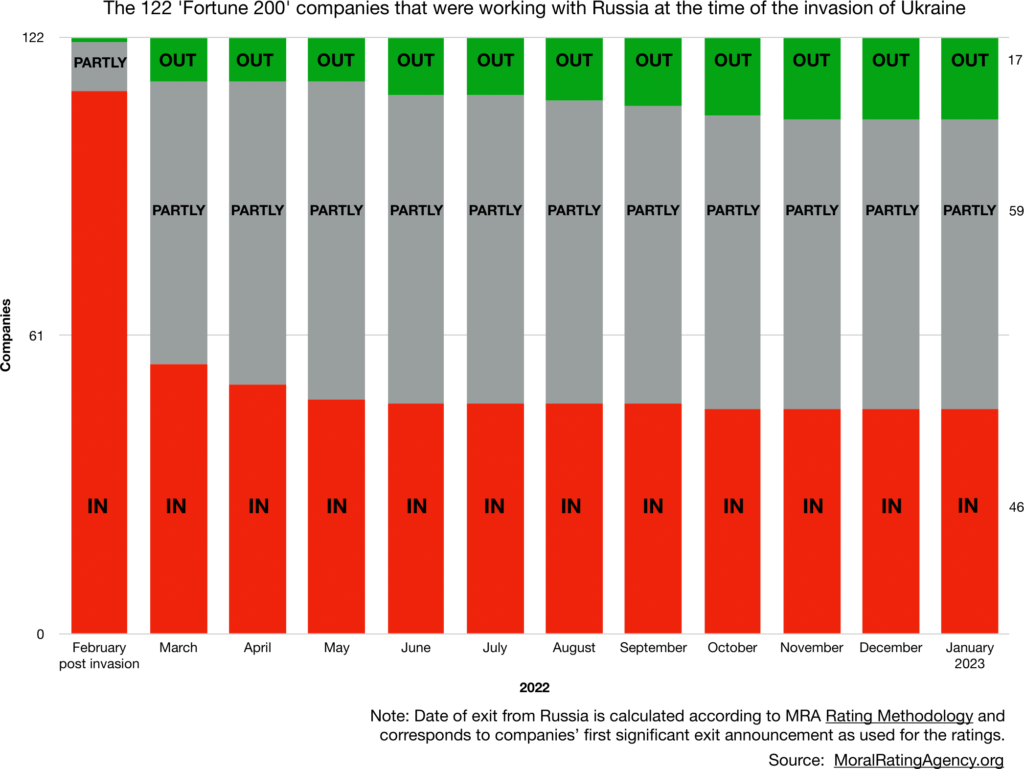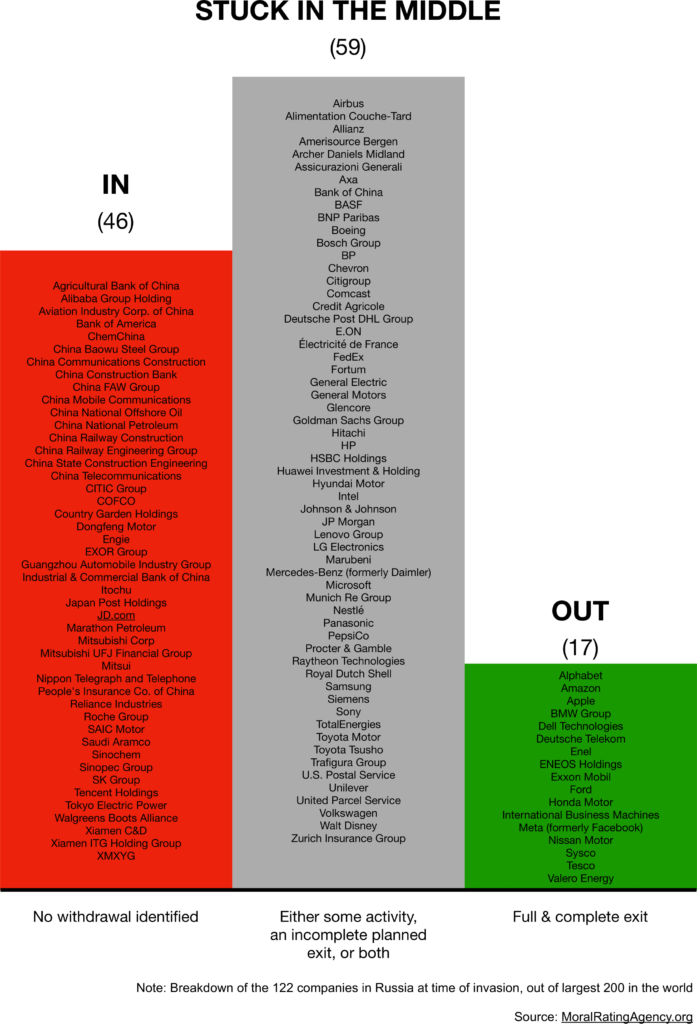A campaign group, Moral Rating Agency, set up after Russia invaded Ukraine, which exposes and credits companies through moral ratings, has disclosed the companies are still working with Russia as of 31 Jan 2023.
Despite some early progress in March – May 2022, most companies are either stuck on their journey out of Russia or have yet to take action. The latest report of the Moral Rating Agency shows little progress in ceasing operations in Russia by businesses in the last eight months and names the companies that stay.
Exiting Russia is like pulling teeth
Since the initial reaction to the invasion in February 2022, the number of companies totally out of Russia has not increased much.

There was early progress in March when many corporations exited some activities but not others. After May 2022, not much changed.
The “hard core” of companies showing no action has hardly diminished in size. There has been a gradual but yet pathetic improvement from being partly out to totally out during the eight months since May 2022. In short, almost all companies have been stuck in their initial Spring 2022 categories.
The good, the bad, and the ugly
By 31 January 2023, only 17 companies — or 14% — from the top 122 global companies involved with Russia during Ukraine’s invasion had exited all of their activities.

The largest group (59) comprises those “stuck in the middle,” making a partial or incomplete withdrawal. These include companies on a journey as well as those with no intention to move an inch.
Meanwhile, no exit at all was seen for 46 companies. These “hardcore” companies may be beyond embarrassment, feeling they have already suffered the full consequence of not having left, where the story of their failure is now old, and their reputations have already been damaged. Thus, they may no longer have any incentive to make the morally required sacrifice.
“Often companies say they will get out, but the devil is in the detail. They often get credit before they have left – they are devils in angels’ clothing,” the head of the Moral Rating Agency, Mark Dixon, said.
Getting credit for paltry actions
Unfortunately, companies that take partial action often get full credit.
Their exit deficiencies span over a wide range of shortcomings, from those that have put a toe outside Russia to those that keep a foot in the door.
Activities measured include exports, imports, wholly-owned factories and assets, offices, and partly-owned investments. Large corporations usually need to take many actions to get a clean rating under the Moral Rating Agency’s strict ‘out means out’ rule.
The agency found that companies use four loopholes or excuses to avoid a proper exit:
- A Russian activity is not mentioned in the statement, allowing the corporation to keep operating something that is often economically more significant than the announced closure without people knowing.
- The corporation makes an exit with a “carve-out,” such as for essential goods. The MRA calls them “confused humanitarians.”
- A factory or operation is mothballed, but employees are retained so the lights can be switched on at a moment’s notice.
- A sale of a Russian company or asset is promised but without any timeframe for the actual sale, which may never materialize. The MRA calls these companies “asset sloths.” They may be spinning wheels on purpose or may be sincere. In either case, the more the sale is delayed, the harder it becomes to find a buyer.
Moralwashing
Companies often don’t just fail to exit properly but also exaggerate or spin up their paltry efforts.
The group has found that companies are involved in many different types of moralwashing, or confusing statements that make a lack of action regarding Russia less blatant.
“Moralwashing must be called out. Companies are acting immorally but are getting credit for being moral. Moralwashing also negates the motivation to take action, so in practice moralwashing and helping Putin amount to the same thing,” the head of the Moral Rating Agency added.
The most prevalent type of bad communication is the “red herring” statement: corporations often make a “big splash” by promising they will not make further investments in Russia. 18 cases were found among the top 200 companies, representing 35% of the “communications failures.”
The MRA said it considers such statements gratuitous — because it is a promise unrelated to existing activities, and redundant — because investments in Russia are hardly likely at this time.
Companies also announced breaks with Russia while “forgetting” activities they didn’t cut. These cases of “corporate amnesia” were monitored 12 times. The MRA also found ten cases of “wriggle-room wording” and eleven cases of “confusing wording.”
“Wriggle-room wording,” often in the fine print of announcements, gives the company a chance to continue operating activity in Russia while looking like it is cutting links.
“Confusing wording” gives the impression that a company is doing more than it is or makes it difficult to see that it may be doing almost nothing.
The result of the moralwashing is that companies are becoming false heroes.
Related:
- Procter & Gamble continues sponsoring Russia’s war with two giant factories
- 2,370 UK-owned Russian companies profit from foreign money
- Dispute between Moscow and Kyiv about Soviet property abroad heating up
- Are the sanctions on Russia working?


